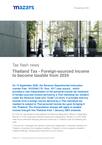
Thailand Tax - Foreign-sourced income to become taxable from 2024
In short, it provides that any income from a foreign source derived by a Thai individual tax resident is subject to Thai personal income tax upon bringing it into Thailand. The interpretation change will apply to taxable income brought into Thailand from 1 January 2024 onwards.
DI. Paw. 161 was issued as new guidance for Revenue Department officers in interpreting Section 41 of the Code and overrules the previous interpretation. Section 41 of the Code rules that an individual shall pay personal income tax in Thailand under the following two rules:
I. Source rule: A taxpayer who derives income from employment, a business carried on in Thailand, a business of an employer residing in Thailand, or from a property situated in Thailand shall pay Thai personal income tax on such income.
II. Resident rule: A Thai tax resident who derives income from employment or business carried on abroad or from a property situated abroad shall pay tax in Thailand upon bringing such assessable income into Thailand.
Any person staying in Thailand for a period or periods aggregating 180 days or more in any tax year shall be deemed a resident of Thailand.
The Code broadly states that a Thai tax resident must pay tax on foreign-sourced income derived in the previous tax year upon bringing it into Thailand. The Revenue Department, in 1987 (BE2530), issued a tax ruling to extend a condition for Thailand to impose tax on income from a foreign source, that the assessable income must be brought into Thailand in the same calendar year that the income is received (the Revenue Department's tax ruling no. Gor. Kor. 0802/696 dated 1 May 1987). Since then, the Revenue Department and Thai resident taxpayers have relied on this interpretation that foreign-sourced income is exempt from Thai personal income tax if the income is brought into Thailand in a calendar year following the year in which the income is received. This long-standing interpretation has also significantly influenced tax planning for individuals with offshore businesses and assets.
The new interpretation provided in DI. Paw. 161 is likely to have a significant impact on those Thai resident individuals who derive income from employment, business and assets abroad. For example, Mr. A, a Thai tax resident, had income from selling shares in a Singapore company in 2020 and kept the share consideration, including the capital gain in a bank account in Singapore. If Mr. A brings the proceeds from the capital gain into Thailand in 2024, he must include the capital gain from selling Singapore shares as his assessable income and pay personal income tax for the calendar year 2024. Alternatively, if Mr. A transfers the capital gain proceeds to his bank account in Thailand within 2023, the capital gain is still exempt from Thai personal income tax, under the current interpretation.
Therefore, we recommend that Thai resident individual taxpayers review their income from a foreign source that has been kept in an offshore bank account and consider bringing such income into Thailand within December 2023.
Where Thai domestic law is still silent about a foreign tax credit available for individual taxpayers under this circumstance, a provision under double tax treaties could provide relief from any double tax arising. However, this is subject to an analysis of each treaty.
Please feel free to reach out to Mazars Thailand if you have any questions or require further information.
Source: https://www.rd.go.th/fileadmin/user_upload/kormor/newlaw/dn161A.pdf


